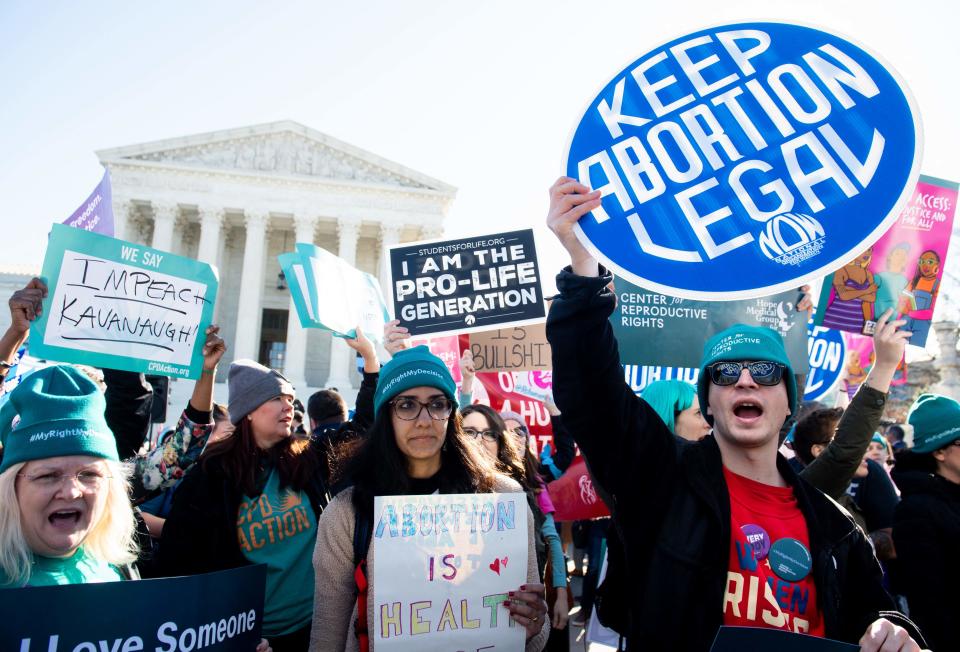What to know about the latest abortion restrictions that have passed in the South
The U.S. Supreme Court is expected to make a final decision soon in a Mississippi case that would determine the future of abortion access in the United States.
But even as the nation awaits the court's ruling, lawmakers across the country have taken steps to either further restrict access to the procedure or protect it in anticipation of surging demand following the decision.
The Guttmacher Institute, a reproductive rights research organization, found that from Jan. 1 to May 25, a total of 42 new restrictions have been enacted in 11 states. Some of the new laws include bans on the distribution of medication used to induce abortion via the mail or through telehealth and new restrictions on when abortions can take place after pregnancy. A total of 19 new laws protecting access to abortion have passed in 11 states, according to the analysis.

Using research compiled from the Guttmacher Institute and work from USA Today Network reporters across the Southeast, here's a look at some of the new abortion-related laws that have passed or are still under consideration in the South.
Florida
Gov. Ron DeSantis signed a ban on most abortions after 15 weeks of pregnancy in April. State laws previously allowed abortions up until 24 weeks. The 15-week ban makes no exceptions for rape or incest but makes exceptions for medical emergencies to save the life of the mother. The law is similar to Mississippi's 15-week ban from 2019. That measure has never been enacted and has been tied up in legal battles heading all the way to the Supreme Court, where it will now be used to determine whether abortion will remain legal nationally.
Last week Planned Parenthood filed a lawsuit challenging Florida's 15-week ban, which was set to take effect on July 1.
Related: Florida's new 15-week abortion ban challenged as violation of state privacy rights
Read this: Abortions in Florida: What's legal and what will get you arrested in Gov. DeSantis' new law?
Louisiana
Senate Bill 342, which criminalizes abortion in Louisiana, making no exception for rape or incest should Roe v. Wade be overturned, was awaiting Gov. John Bel Edwards' signature as of June 8. The law builds on the state's trigger ban, increasing fines against doctors up to $100,000 and 10 years in jail. Pregnant women would not face criminal charges.
A bill banning the ability for companies to dispense the drugs used to induce abortions was approved earlier this month and awaits Edwards' signature. Abortion drugs can only be dispensed under the direct supervision of a licensed provider under Louisiana law. SB 388 aims to target companies that mail the drugs used in a medication abortion. Medically induced abortions involve two different drugs, mifepristone and misoprostol, which can be safely used up to 10 weeks of pregnancy. The U.S. Food and Drug Administration first approved the drugs in 2000. Last year the agency allowed the drugs to be dispensed via telehealth amid the ongoing COVID-19 pandemic.
Passed: Louisiana Legislature passes bill to ban mail-order abortion drugs
Related: Louisiana House passes bill to criminalize abortion with no exceptions for rape, incest
Tennessee
In May, Gov. Bill Lee signed HB 2416, which targets doctors and companies distributing abortion medication via the mail or telehealth. Providers must be licensed within the states and must be present in order to prescribe abortion drugs. The law adds criminal penalties, including fines of up to $50,000 and a prison sentence of up to 20 years, for anyone found in violation of the law.
Gov. Bill Lee: Tennessee Gov. Bill Lee signs law adding criminal penalties to abortion pill distribution via mail
Contributing: John Kennedy, USA TODAY NETWORK - Florida; Greg Hilburn, Lafayette Daily Advertiser; Adam Friedman, Nashville Tennessean; Melissa Brown, Nashville Tennessean
Maria Clark is a general assignment reporter with The American South. Story ideas, tips, questions? Email her at mclark@gannett.com or follow her on Twitter @MariaPClark1.
This article originally appeared on Nashville Tennessean: New abortion restrictions in South as Supreme Court considers ruling

